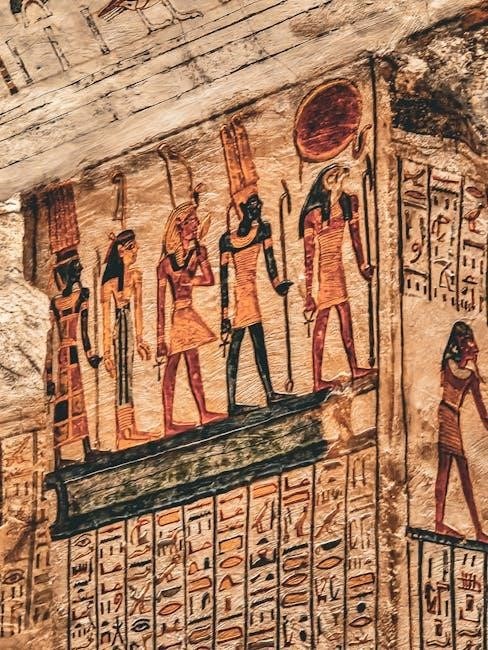This dark comedy reimagines the Peanuts gang as teenagers‚ exploring identity‚ grief‚ and coming-of-age struggles with humor and poignancy‚ written by Bert V. Royal.
Overview of the Play
Dog Sees God: Confessions of a Teenage Blockhead is a dark comedy that reimagines the Peanuts gang as dysfunctional teenagers navigating high school. The play‚ written by Bert V. Royal‚ opens with CB (Charlie Brown) coping with the death of his dog‚ sparking a journey of self-discovery and existential crisis. It delves into themes of grief‚ identity‚ and bullying‚ blending humor with poignant moments. The script explores the complexities of adolescence through a satirical lens‚ offering a fresh‚ edgy take on beloved characters. Its ensemble-driven narrative highlights the struggles of growing up and finding one’s place in the world.
Significance of the Script
Dog Sees God: Confessions of a Teenage Blockhead holds significance as a bold reimagining of Charles Schulz’s Peanuts characters‚ offering a raw‚ modern take on teenage struggles. The script tackles heavy themes like grief‚ identity‚ and bullying with both humor and emotional depth. Its ability to balance dark comedy with heartfelt moments makes it a compelling exploration of adolescent challenges. The play’s relevance lies in its universal appeal‚ resonating with audiences grappling with similar issues. Its success has led to widespread recognition‚ making it a notable work in contemporary theater and a valuable resource for exploring complex social and emotional topics.
Themes and Tone of the Play
Dog Sees God blends dark humor with emotional depth‚ exploring themes of identity‚ grief‚ and teenage angst‚ offering a poignant yet satirical look at modern adolescent struggles.
Exploring Teenage Struggles
Dog Sees God delves into the raw challenges of adolescence‚ reimagining the Peanuts gang as teenagers grappling with identity crises‚ sexual politics‚ and self-love. CB’s journey through grief and existential confusion mirrors universal teenage struggles‚ while characters like Van‚ Beethoven‚ Marcy‚ and Tricia confront their own demons. The play tackles bullying‚ bigotry‚ and first love with unflinching honesty‚ using satire and dark humor to highlight the complexities of growing up. Its heartfelt yet irreverent approach makes it a relatable and powerful exploration of teenage angst and vulnerability.
Dark Humor and Satire
Dog Sees God masterfully employs dark humor and satire to tackle heavy themes‚ blending absurdity with poignant insights. The play’s sharp wit critiques societal norms‚ teenage superficiality‚ and the hypocrisy of adolescence. Royal’s script uses irony and exaggerated scenarios to highlight the characters’ flaws and vulnerabilities‚ creating a comedic yet thought-provoking narrative. This balance of humor and heartache allows the audience to laugh while reflecting on the deeper struggles of growing up. The play’s satirical edge ensures it remains both entertaining and impactful‚ making it a standout in contemporary theater. Its darkly comedic tone resonates with audiences seeking a fresh take on teenage life.

Character Development
CB’s journey through grief and identity crisis drives the character development‚ as he and his childhood friends navigate adolescence with raw emotion and unexpected growth.
The Evolution of CB
CB‚ the protagonist‚ undergoes significant transformation‚ grappling with grief and identity. His journey begins with the death of his dog‚ sparking a quest for meaning. Initially sullen and disconnected‚ CB gradually confronts his insecurities‚ revealing vulnerability and depth. Through interactions with friends like Van‚ Beethoven‚ and Marcy‚ he navigates complex emotions‚ showcasing growth and self-awareness. His evolution from a “blockhead” to a reflective teenager highlights both the challenges and resilience of adolescence‚ making him a relatable and poignant character in this dark comedy.
Supporting Characters and Their Roles
The supporting characters in Dog Sees God play crucial roles in CB’s journey. Van‚ the charismatic yet troubled friend‚ offers wisdom and humor‚ while Beethoven‚ now a bullying pianist‚ represents unresolved conflicts. Marcy‚ the introspective artist‚ provides emotional depth and connection. Matt‚ the homophobic jock‚ and Lucy‚ the manipulative Goth‚ add complexity to the group dynamics. Each character’s transformation from their Peanuts counterparts adds layers to the story‚ exploring themes of identity‚ trauma‚ and relationships. Their interactions with CB drive the narrative‚ creating a rich tapestry of teenage struggles and growth.

Plot Summary
CB navigates grief‚ identity‚ and relationships after his dog’s death‚ encountering a reimagined Peanuts gang grappling with teenage struggles‚ driving his emotional journey and self-discovery.
Key Events and Turning Points
The play opens with CB coping with the death of his dog‚ sparking his existential crisis. He writes to a pen pal‚ reflecting on his struggles and relationships. CB interacts with a reimagined Peanuts gang‚ including Van‚ who mocks him‚ Beethoven‚ who remains loyal‚ and Marcy‚ who offers empathy. These interactions reveal CB’s internal turmoil and his inability to connect. A turning point occurs when CB confronts his own identity and the superficiality of his peers‚ leading to a poignant realization about self-acceptance and understanding others. These events drive CB’s emotional journey toward resilience and self-discovery.
Resolution and Message
The play concludes with CB finding a sense of peace after confronting his grief and the harsh realities of his world. The resolution emphasizes self-acceptance and the struggle to connect in a flawed world. The message is powerful‚ urging empathy and understanding. By addressing universal themes with a balance of humor and drama‚ the play resonates deeply‚ leaving a lasting impact and prompting reflection on adolescence and human connection.

Reception and Reviews
The play received critical acclaim for its dark humor and heartfelt drama‚ resonating with audiences and praised for its bold take on teenage struggles and identity.
Critical Acclaim
Critics praised Dog Sees God for its bold‚ satirical approach to the Peanuts characters‚ addressing heavy themes like identity and grief with both humor and sensitivity. The script was lauded for its well-crafted dialogue and emotional depth‚ making it a standout in contemporary theater. Bert V. Royal’s writing was commended for its ability to balance dark comedy with heartfelt moments‚ creating a relatable and impactful experience for audiences. The play’s unique perspective on adolescence earned it widespread critical acclaim and a loyal following in the theater community.
Audience Response
Audiences resonated deeply with Dog Sees God‚ appreciating its raw portrayal of teenage struggles and dark humor. Many found the script relatable‚ as it tackled real-life issues with authenticity. The play’s ability to balance laughter with poignant moments created a memorable experience‚ leaving viewers reflective and engaged. The strong ensemble dynamics and character development further enhanced its appeal‚ making it a favorite among both young adults and older audiences who connected with the modern reinterpretation of beloved characters. The emotional journey of CB and his friends struck a chord‚ fostering a loyal fan base for the production.

Availability of the Script
The Dog Sees God script is widely available as a PDF and in paperback. It can be purchased on platforms like Amazon‚ Google Play‚ and Dramatists Play Service.
Where to Find the PDF
The Dog Sees God: Confessions of a Teenage Blockhead script in PDF format is available for purchase on platforms like Amazon and Google Play. It can also be accessed through the Dramatists Play Service. Additionally‚ some theater communities and educational institutions offer the PDF for download. Always ensure you obtain the script from authorized sources to support the playwright and comply with copyright laws.
Accessing the Full Script
To access the full script of Dog Sees God: Confessions of a Teenage Blockhead‚ you can purchase it through platforms like Amazon or Dramatists Play Service. Additionally‚ some universities and theater groups offer the PDF for educational purposes. The script is a heartfelt yet comedic exploration of teenage struggles‚ grief‚ and identity‚ written by Bert V. Royal. Ensure to obtain it from authorized sources to support the playwright and adhere to copyright laws. This play is a modern‚ darker take on the Peanuts characters‚ making it a compelling read for fans of dramatic comedy.

Performance History
Dog Sees God: Confessions of a Teenage Blockhead premiered Off-Broadway in 2005 and has been performed in various theaters and colleges‚ praised for its dark humor and relatable teenage struggles.
Notable Productions
Dog Sees God: Confessions of a Teenage Blockhead premiered Off-Broadway in 2005‚ receiving critical acclaim for its dark humor and relatable portrayal of teenage struggles. Notable productions include a 2017 staging at Golden West College and a 2019 student workshop performance that highlighted the play’s resonance with younger audiences. Its ability to blend satire with heartfelt drama has made it a favorite in theater communities‚ with many productions praised for their strong ensemble performances and faithful adaptation of Bert V. Royal’s script.
Impact on Theater Communities
Dog Sees God has become a favorite in theater communities for its raw portrayal of teenage life and universal themes. Its dark humor and emotional depth resonate strongly with young audiences‚ making it a popular choice for school and college productions. The play’s ability to spark discussions about identity‚ grief‚ and societal pressures has solidified its place in contemporary theater. Many theater groups appreciate its relatable characters and bold storytelling‚ ensuring its continued relevance and appeal to both performers and audiences alike.
Playwright Bert V. Royal
Bert V. Royal‚ known for his work on Easy A‚ crafted Dog Sees God‚ blending dark humor with poignant teenage struggles‚ premiering Off-Broadway in 2005.
Background and Other Works
Bert V. Royal is a playwright and screenwriter‚ best known for Dog Sees God and the hit film Easy A. His work often explores adolescent challenges with humor and depth.
Style and Influence
Bert V. Royal’s writing style in Dog Sees God blends sharp satire with heartfelt emotional depth‚ reimagining beloved characters in a modern‚ edgy context. His ability to balance dark humor with poignant themes has influenced contemporary theater and film‚ offering a fresh take on adolescent struggles. Royal’s work resonates with audiences‚ making him a significant voice in both comedic and dramatic storytelling.
